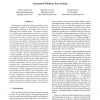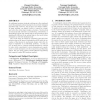181 search results - page 23 / 37 » Negative selection algorithms without generating detectors |
NDSS
2008
IEEE
14 years 2 months ago
2008
IEEE
Fuzz testing is an effective technique for finding security vulnerabilities in software. Traditionally, fuzz testing tools apply random mutations to well-formed inputs of a progr...
COCO
2006
Springer
13 years 11 months ago
2006
Springer
We consider a general approach to the hoary problem of (im)proving circuit lower bounds. We define notions of hardness condensing and hardness extraction, in analogy to the corres...
KDD
2004
ACM
14 years 8 months ago
2004
ACM
Essentially all data mining algorithms assume that the datagenerating process is independent of the data miner's activities. However, in many domains, including spam detectio...
SIGECOM
2006
ACM
14 years 1 months ago
2006
ACM
In multiagent systems, strategic settings are often analyzed under the assumption that the players choose their strategies simultaneously. However, this model is not always realis...
DATE
2000
IEEE
14 years 2 days ago
2000
IEEE
This paper presents a method for redundancy identification (RID) using multi-node logic implications. The algorithm discovers a large number of direct and indirect implications b...


